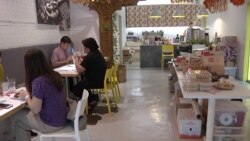Baker David Wong knows the preferences of his regular customers — whether it’s an iced latte or marinated chicken with a local coconut rice dish known as Nasi Lemak.
But his most popular item is the pineapple tarts that are made with his mother’s recipe. “She taught me how to bake. That is the seed she has sewn in me,” said Wong. “From a young age I helped my mom to bake.”
After leaving his father’s property development company, Wong, age 46, opened a bakery that he later expanded into a cafe, Swee Bee by Baker Dave, named after his mother. “It’s all about the passions and the love of baking and cooking that I love,” Wong said. “I wanted to bring it out and share it with my customers, friends and family.”
On a recent afternoon, Shamir Chakrabarty enjoyed his chicken lunch. Chakrabarty and his wife have been coming to Swee Bee for the past four-years. “The food is great,” Chakrabarty said. “The atmosphere is nice and Dave is so friendly.”
The cafe is in a commercial district and primarily attracts office workers. But fewer laborers have been working nearby during the past few months because of restrictions in place due to COVID-19. Even though the local economy has been reopening in phases and customers have been allowed to dine in, many of the cafe’s regulars still work from home. Wong says business during April and May was down 70% of what is normal for that time of year. So last Friday he shut down his cafe. “In the blink of an eye I have to leave,” Wong said. “I have to make a decision because economically I can’t sustain.”
There are similar stories across Malaysia. Local trade groups say five to ten percent of the small mom and pop type restaurants — as well as retail stores — have gone out of business during the past few months.
Analysts say some small businesses could not adapt quickly enough after restrictions were put in place because of COVID-19, especially those that depend on walk-in customers.
“Some businesses try to adopt a digital solution to it, try to have e-commerce platform and for e-hailing riders to deliver your products, but that has not been successfully played out in many of these SMEs or small businesses,” said Lau Zheng Zhou of the Kuala Lumpur-based think tank the Institute for Democracy and Economic Affairs. “To expect businesses to disrupt their business model to adapt and survive is too high an order for many businesses.”
Lau says the government’s stimulus package which includes wage subsidies and funding to help companies defray costs is not always enough to convince some owners to keep their businesses open.
“Businesses are thinking you know what maybe I should just close the shop,” Lau said. “Because it could be more costly paying daily bills like wages, electricity bill, delivery orders.”
Wong says in addition to those issues he was also unable to convince his landlord to lower the rent. All of these factors combined convinced him to close the cafe. “Emotionally it’s tough to end something that I love after all of these years,” he said.
Amy Loh works nearby and typically went to Swee Bee several times a week. “I’ve been a regular here for three and half years,” Loh said just before eating lunch at the cafe. “So it’s not just about the food and everything. It’s about the relationship with them as well.”
Before the COVID-19 crisis, Wong already had plans to open a commercial bakery so he could make more pineapple tarts to sell to retail stores and restaurants. He’s continuing with those plans but says it won’t make up for the daily interaction that he’ll no longer have with his cafe’s customers. “The relationship that has been built with them over eight years cannot be replaced,” he said. “I’ll miss that the most.”









